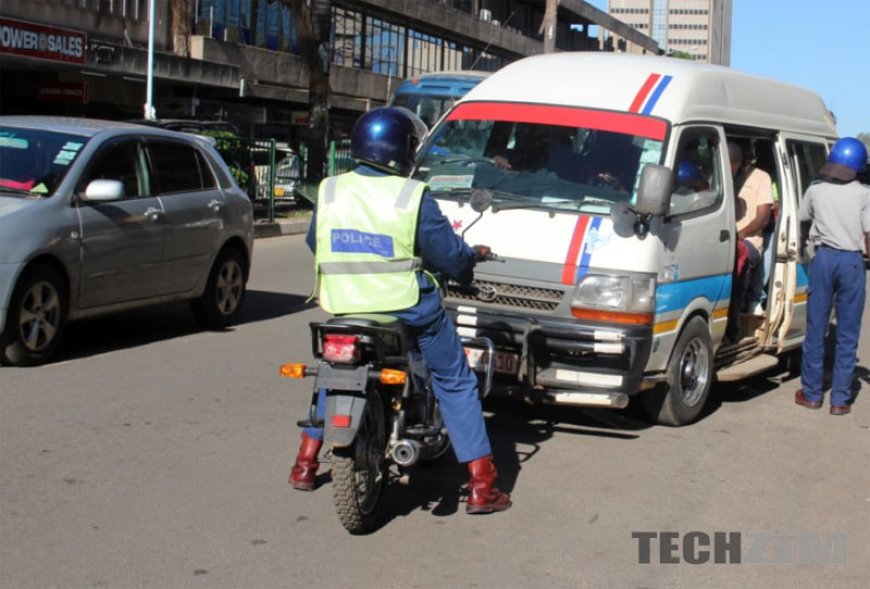I have trouble believing Zim’s upcoming smart traffic management system will succeed
Chaos begets chaos. You need only observe the way Zimbos drive, especially Hararians. You would be forgiven for thinking the red light means ‘stop’. No, to most Zimbos it’s just there to add ambience to road intersections. One of the major reasons they drive this way is that they know they can get away with […] The post I have trouble believing Zim’s upcoming smart traffic management system will succeed appeared first on Techzim.


Chaos begets chaos. You need only observe the way Zimbos drive, especially Hararians. You would be forgiven for thinking the red light means ‘stop’. No, to most Zimbos it’s just there to add ambience to road intersections.
One of the major reasons they drive this way is that they know they can get away with it.
You can run through seven red lights in a row and unless a motivated policeman happens to observe you drive so and chases after you, you will face no consequences for this behaviour.
Unfortunately, the consequences could be a bribe to the policeman. Yes, in most cases, a ten dollar bill (or more if you were particularly egregious) can wipe out any infraction. So, even when you see a policeman chase after a reckless driver, you know it’s only to line the policeman’s pockets.
Indeed, Zimbos hate it when the police chase after reckless drivers because they know it’s about bribe collection. The offending driver will be back on the road once he pays his tithe.
That’s the problem. The govt believes the solution is a …
Smart traffic management system
The govt wants to implement an $80 million smart traffic management system to reduce road accidents, congestion, and corruption.
The system was developed by Dubai-based Vitronic Machine Vision Middle East and will initially be deployed in Harare and Bulawayo. Victronic has apparently installed similar systems in a number of countries, including France, Germany, UAE, Saudi Arabia and Rwanda.
The system includes intelligent cameras linked to databases of stolen vehicles and wanted criminals.
The project aims to enhance law enforcement, improve revenue streams, and promote road safety by minimising human intervention in traffic management. If we can’t trust humans, we might as well surrender to our robot overlords.
The investment will be recouped through fines for traffic violations. Victronic will have a revenue sharing arrangement with the govt so don’t worry, your favourite politicians will not have to go years without that revenue.
All good but…
As I’m sure most of you have personally experienced, slapping a smart system on a problem does not magically solve it. There is a good chance this will be $80 million down the drain. Let’s look at some of the prerequisites for a successful traffic management system:
Advanced technology:
Integration of intelligent cameras, sensors, and real-time data processing is essential. We don’t have to worry too much about this part. Victronic will supply.
Robust Infrastructure:
We will need reliable power supply, internet connectivity, and road infrastructure. This is where the worry comes in.
Reliable internet connectivity should not be that big of a problem. There are various fixed and wireless internet service providers to ensure this won’t be a problem.
Our road infrastructure is not up to snuff. However, the govt is on a road rehabilitation spree and so let’s assume road infrastructure will be decent in the near future.
Reliable power supply seems like the hardest one to achieve. We have seen improvement in power supply ever since the Hwange expansion project. However, we are still far from claiming ‘reliable power supply.’
Given the potential challenges with grid electricity, the traffic management system could use solar power like many Zimbabwean households.
Comprehensive Database:
We will need accurate and updated information on vehicles, drivers, and traffic patterns. I don’t know about you but I think we will struggle with this one.
A year ago, this was the headline “Driver’s Licences Backlog Rises To 600 000.” Some decentralisation was undertaken to combat that but who among us is willing to bet even $5 that the Central Vehicle Registry and other govt agencies have resolved their efficiency problems in the last 12 months?
The traffic management system will be less useful when it captures images of offending vehicles that do not have licence plates and are not in any system yet.
Law Enforcement Integration:
Coordination with police and emergency services will be essential. I’m not thrilled about it either but the police will remain integral to the success of the traffic management system.
Meaning the human intervention we were trying to run away from cannot be fully dodged. However, if implemented well, we still could limit the amount of corruption they can engage in.
Public Awareness and Compliance:
Like all systems, there will be no success if there is no public buy-in. Education campaigns to ensure public cooperation will need to be undertaken.
I don’t know how Zimbos will respond to this. I think they will buy into this but ya’ll are a weird bunch, I wouldn’t bet on it.
Sustainable Funding:
For the traffic management system to succeed, it will need continuous investment and maintenance. I’m not too confident the system will get continuous investment and maintenance.
As Zimbos, we have a bad track record when it comes to maintenance. We talked about the govt being on a road rehabilitation spree but we should have been maintaining these roads, not waiting until they are in tatters to then hastily rehabilitate them.
I imagine if the traffic management system is installed, some offenders will pay fines but will a portion of those fines be set aside for maintenance? History says not enough will be set aside, most will be diverted.
We hope it succeeds
Crossing the street in Harare is not that different from crossing a landmine rich plot of land. You could be following all the rules of the road and you still could be run over by a minibus that’s trying to beat traffic by driving along the pedestrians’ pavement.
So, we want the traffic management system to succeed. We want offenders to get home to tickets in their mailboxes like it is in other countries.
Do note that similar systems have had mixed results in different countries. Some have succeeded and some have not.
Light research shows how the following 3 countries failed to successfully deploy traffic management systems.
India:
- Challenges: Poor infrastructure, lack of enforcement, and high corruption levels.
- Outcome: Systems failed to significantly reduce traffic congestion and violations.
Nigeria:
- Challenges: Inconsistent power supply, lack of maintenance, and public non-compliance.
- Outcome: The system’s effectiveness was undermined, leading to minimal improvements.
Kenya:
- Challenges: Insufficient funding, technical issues, and resistance from the public.
- Outcome: The system faced operational challenges and did not meet its objectives.
Some might argue that these systems were/are successful but it remains that they underachieved. Zimbabwe has to be diligent otherwise we will be listed among these countries.
If we’re being honest, the challenges these 3 countries faced are packed in tight in Zimbabwe. The only thing we’re not sure of is public non-compliance, however, for the rest, Zimbabwe has them in spades.
If I were a betting man, I would bet on Zim’s smart traffic management system failing. It pains me to admit, but it is what it is.
Also read:
- China Now Has a Robot Traffic Police Force
- NetOne & ZRP Coming Together To Reduce Traffic Congestion
- Provisional licence test can now be taken in Shona, Ndebele; plastic driver’s licence upon us
The post I have trouble believing Zim’s upcoming smart traffic management system will succeed appeared first on Techzim.
What's Your Reaction?




















































